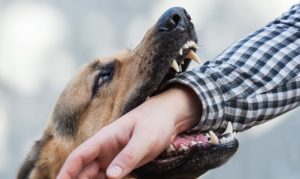 While most domesticated dogs are not a threat to people, they are still animals. Should a dog bite or attack, you could face serious or even fatal injuries.
While most domesticated dogs are not a threat to people, they are still animals. Should a dog bite or attack, you could face serious or even fatal injuries.
A dog bite injury not only causes physical pain; it can also leave victims traumatized. In some cases, victims remain incapacitated for a very long time. They face enormous medical bills, lost wages, and other damages. If you have suffered a dog bite injury, you may seek compensation for your injuries. To learn more about your legal options, consult a South Carolina dog bite lawyer as soon as possible. Contact the South Carolina dog bite injury lawyers at Hughey Law Firm today for more information.
SC Dog Bite Laws
Dog bite victims are generally entitled to compensation. SC Code Ann. 47-3-110 reads in relevant part, “the owner of the dog or other person having the dog in his care or keeping is liable for the damages suffered by the person bitten or otherwise attacked…” Various South Carolina court cases have interpreted the law to mean that the owner is legally responsible for his or her dog even if the dog is in someone else’s control or keeping at the time of the incident.
Some states have one-bite laws in which the dog owner or caretaker is only liable if they knew or should have known about the dog’s dangerous tendencies. This is known as a one-bite law. Essentially, the animal gets “one free bite,” after which the owner knows of (and is responsible for) the animal’s vicious propensities. However, the dog bite law in South Carolina is a strict liability statute. Under a strict liability statute, the injured person does not have to establish that the dog owner or caretaker knew or should have known that the dog had a propensity to attack.
Dog owners are liable for more than just dog bites; they are also accountable for injuries that happen if a dog “otherwise attacks” another individual. For example, a dog may pounce on a person who is trying to escape from the dog’s attack. The dog may knock someone down, especially a child or an elderly person, and hurt them. In those circumstances, the dog owner may be responsible for that injury. Some South Carolina cities and counties have breed-specific laws, regulating the ownership of dogs considered to be dangerous—for example, pit bulls or Doberman pinschers.
Who Is Liable for Dog Bites?
When a dog in South Carolina causes injury to a person, the dog’s owner (or caretaker in control) is responsible for the resulting harm. The injured person only needs to show that the dog bit or attacked them.
A property owner or landlord may bear a liability to invited guests as well as people who are on the property for business purposes. A person who keeps someone else’s dog or has it in their care may be liable for the injured victim’s damages. This means people, such as professional pet-sitters, dog-walkers, or kennel operators, may be held liable for an attack.
Additional parties who may be liable include:
- Someone other than the owner who was taking care of the dog or had control over the dog.
- If the dog’s owner is less than 18 years old, there is a chance that his or her parents may be liable.
- If the owner’s landlord knows that a renter had a dog on the premises that was vicious or dangerous but did not do anything about it, the landlord may be liable.
Exceptions to Liability for Dog Bites
The law says that dog owners may not be liable for dog bite damages if “the person who was attacked provoked or harassed the dog and that provocation was the proximate cause of the attack.” When a dog feels anxious or threatened by a situation, they generally either escape or fight. If the dog feels trapped, it may show warning signs of aggression. Examples of provocation include hitting the dog, startling the dog, or pulling on its tail, ears, legs, or fur.
Dog owners are not liable for bites if the victim was trespassing at the time. Trespassing means the person was on the property without permission. To be clear, it does not include lawfully entering the property to perform a duty (like a postal worker delivering the mail).
Another exception applies to dogs that are working with law enforcement officers. If the attack complied with the officer’s commands, then the dog owner is not liable. The dog must also meet the training and certification standards of the state.
Workers’ Compensation and Dog Bite Injuries
According to the United States Postal Service (USPS), in a recent year, there were nearly 6,000 postal employees attacked by dogs. Today, there are many people, such as delivery persons, repair persons, or other employees who must enter private residences or property to do their jobs. Increasingly, strangers are bringing packages, food, and more to our homes.
A dog may think that handing a package to a family member is a threatening gesture. Dogs who perceive a threat may break through a screen door and bite. If a dog bites an employee, the employee can submit a claim for workers’ compensation benefits.
Under the law, there is an “implied invitation” to workers who have entered the property. They are acting within the scope of their employment and are entitled to compensation. They may also have a legal claim against the dog’s owner (provided it is not owned by the employer) for compensation for injuries not covered by workers’ compensation, such as pain and suffering.
What Types of Injuries Occur From Dog Bites?
 According to a recent survey, over 63 million households in the United States own at least one dog. The American Veterinary Medical Association (AVMA) and the Centers for Disease Control and Prevention (CDC) report that more than 4.5 million people experience dog bites each year in the United States; about half of them are children. According to State Farm, South Carolina ranked No. 21 in dog bite injuries, with 62 insurance claims and $1.7 million paid in one year alone. Thousands of dog bite victims need reconstructive surgery, as well as long-term psychological support.
According to a recent survey, over 63 million households in the United States own at least one dog. The American Veterinary Medical Association (AVMA) and the Centers for Disease Control and Prevention (CDC) report that more than 4.5 million people experience dog bites each year in the United States; about half of them are children. According to State Farm, South Carolina ranked No. 21 in dog bite injuries, with 62 insurance claims and $1.7 million paid in one year alone. Thousands of dog bite victims need reconstructive surgery, as well as long-term psychological support.
Of course, the number of claims and settlements represents only a few dog bites in South Carolina every year.
According to American Humane, two-thirds of the injuries occurring in children four years or younger are to the head or neck region. Children and infants account for a high percentage of dog bite fatalities.
For victims of all ages, some of the common injuries include:
- Puncture wounds.
- Soft tissue injuries.
- Cuts, bruises, and abrasions.
- Lacerations.
- Permanent scarring (children often have facial scarring).
- Fractures and broken bones.
- Traumatic brain injuries (TBIs).
- Emotional distress.
Along with the physical injuries, there is a risk of serious infections caused by the bite’s germs and bacteria. Infection happens in about 10 to 15 percent of dog bite injuries, according to the American Academy of Pediatrics.
The bites can lead to infections such as:
- Rabies. It is a rare but very serious disease people can get from dog bites. The rabies virus affects the brain; it spreads through direct contact with the nervous system tissue or saliva from an infected animal. Once symptoms appear, it is almost always fatal. People with rabies usually contract it from the bite of an infected animal. Domestic dogs are the source of up to 99% of rabies cases in humans. If a dog has bitten you, you should seek immediate medical care.
- Tetanus from a dog bite may result in rigid paralysis.
- MRSA (methicillin-resistant Staphylococcus aureus) is a dangerous, antibiotic-resistant type of staph infection. Dogs and other animals may have MRSA without experiencing any symptoms. However, MRSA infections are very dangerous and life-threatening for humans. They often spread and may affect the heart, lungs, bones, joints, urinary tract, and bloodstream. The infections can become life-threatening.
- Pasteurella multocida. This bacteria is in more than 50 percent of dog bite wound infections. In addition to a painful infection from the bite, victims may suffer joint pain, swollen glands, and limited mobility. The infection is potentially dangerous, especially for those with weakened immune systems, and can cause a chronic local infection of deep tissues and osteomyelitis.
- Capnocytophaga bacteria. This type of bacteria lives in the mouths of people, dogs, and cats. The dog is not affected by the bacteria, but it can spread to people through bites or scratches. Not everyone becomes sick, but those who have a weakened immune system face a much greater risk of becoming sick because it is harder for their bodies to fight infections.
Insurance Coverage and Dog Bite Injuries
Homeowners insurance may cover damages in some circumstances. The homeowner’s insurance usually does not explicitly cover dog bites, but dog bites are part of liability coverage. Generally, homeowners and renters insurance policies offer dog bite liability coverage, but some policies exclude dog bites.
Damages in Dog Bite Cases
A person who has suffered a dog bite injury may receive both economic and non-economic damages. Economic damages include compensation for current and future medical bills, including emergency care, ongoing doctor visits, medication, therapy, and rehabilitation. Typically, it also includes lost wages and other financial losses incurred due to the injury. Non-economic damages, also known as pain and suffering damages, are more difficult to quantify because they are compensation for more abstract losses. They may include the loss of enjoyment of life, emotional distress and mental anguish, disability or disfigurement, and loss of consortium.
If the victim dies as a result of the injury, then the victim’s family may bring a wrongful death claim against the dog’s owner.
What Do I do After a Dog Bite?
In the confusion and trauma following a dog bite, you may not know what to do. Here are some steps to take:
If you suffer a dog bite, you should clean the wound and seek medical treatment. A record of your medical treatment may be necessary if you pursue legal action. You or your doctor should report the bite to the South Carolina Department of Health and Environmental Control. South Carolina law requires any dog who bites a human to be quarantined for observation for ten days, either at the dog owner’s property or a local animal control shelter.
Try to get the name and address of the dog’s owner. Not only can this help you if you decide to take legal action against the owner, but it could also help your medical provider determine your risk of contracting rabies. If a stray dog or unleashed dog bit you, or you do not know where the dog is, you may need to undergo a series of rabies vaccinations. You must also need to undergo these vaccinations if the dog that bit you was monitored and has shown signs of being rabid.
Record what happened. After getting medical treatment, you should immediately file a bite report with the local police. In the aftermath of a dog bite you may be scared and confused, or forget the details of the incident. Keep detailed notes about what occurred. Writing down everything you recall may help later with insurance or legal claims. It is important to note where you were when the incident took place and whether anyone was restraining the dog at the time. Take pictures of your injuries, the scene of the dog bite, and any damaged or bloody clothing. Also, try to get names and contact information for any witnesses.
South Carolina Dog Bite FAQs
 Dog bites are common throughout the country, including in South Carolina. Dog bites not only create the risk of scarring and disfigurement but can also result in serious or even life-threatening complications due to the many types of bacteria found in dog saliva that can lead to an infection. If a dog bit you in South Carolina, you can pursue compensation for the expenses and impacts to your life caused by the injury. Read on for answers to some of the questions that our clients most frequently ask about dog bite liability in South Carolina.
Dog bites are common throughout the country, including in South Carolina. Dog bites not only create the risk of scarring and disfigurement but can also result in serious or even life-threatening complications due to the many types of bacteria found in dog saliva that can lead to an infection. If a dog bit you in South Carolina, you can pursue compensation for the expenses and impacts to your life caused by the injury. Read on for answers to some of the questions that our clients most frequently ask about dog bite liability in South Carolina.
What is strict liability in a South Carolina dog bite case?
When it comes to state laws pertaining to dangerous or aggressive dogs, some states—including South Carolina—hold dog owners strictly liable for the injuries caused by their dogs, while other states follow a “one-bite” rule. Strict liability means that the property owner is liable for injuries caused to others by the dog, even if the owner had no reason to believe that the dog would behave aggressively.
The one-bite rule holds that dog owners are only liable if they had reason to know that the dog would bite. Essentially, this means that the dog owner is only liable the second or each subsequent time that his or her dog bites.
How do I obtain compensation for my South Carolina dog bite injuries?
Individuals injured by a dog bite or attack in South Carolina can pursue compensation relating to the expense and impacts of their injuries through a lawsuit filed in civil court within three years of the dog bite. The claim seeks to show not only who caused the injury but also place a dollar amount on the expenses and impacts incurred from the injury.
How are South Carolina dog bite claims paid?
Generally, the dog owner’s homeowner’s or renter’s insurance policy pays dog bite claims. Most homeowner’s or renter’s insurance policies will provide coverage for dog bite injuries, and most of these policies have limits between $100,000 to $300,000. If the expenses exceed that amount, the homeowner must cover the remainder. However, some insurers will not provide coverage for certain breeds of dogs, including pit bull breeds, and some insurers even make their insured parties sign waivers regarding dog bite liability to limit potential losses. Liability claims resulting from dog bites and dog-related injuries cost insurers around $797 million each year.
What damages are available to me through a South Carolina dog bite lawsuit?
Damage is a term that refers to a payment made for harm caused. South Carolina allows dog bite victims to seek both economic and non-economic damages. Economic damages refer to a payment made for the out-of-pocket expenses that you incurred as a result of your injury.
Common expenses included in a damage claim are:
- Medical treatment, including emergency department treatment, ambulance transport, prescription medication, hospitalization, surgical and physician services, and more.
- Lost wages if your injury caused you to miss work.
- Loss of future earning capacity, if your injury caused a disability that prevents you from returning to work or from earning in the same capacity as you did before the injury occurred.
Non-economic damages are compensation for how your injury has impacted your life.
Some common impacts included in a damage claim are:
- Physical pain and suffering
- Emotional distress
- Loss of the enjoyment of life, if your injury prevents you from doing activities you previously enjoyed
What is the time limit to file a dog bite lawsuit in South Carolina?
Generally, the time limit to file a dog bite lawsuit in South Carolina is three years after the injury date. However, this deadline “tolls” or extends if the case involves a child victim whose parents do not file a lawsuit on their child’s behalf. In cases involving a dog bite resulting from a dog used by a government agency, the time limit and the process for filing a claim is shorter. Your attorney will let you know if there is a different timeline for filing your case.
I was injured in South Carolina by an aggressive dog that knocked me over but didn’t bite me. Is the owner liable?
Yes. South Carolina’s law states that dog owners are liable if their dog bites “or otherwise attacks” a person. An attack can involve any aggressive behavior, including biting, clawing, or knocking an individual to the ground.
Is there any occasion when a dog bites someone in South Carolina, and the dog owner is not liable for the injuries?
Yes.
Despite South Carolina’s strict liability for dog bites, there are several exceptions in which the dog owner would not face liability, such as:
- If the individual provoked the dog and that led to the dog bite. Provocative behavior that may relieve a dog owner from being liable for the bite can include abusing, teasing, or harassing the dog.
- If the dog was working for law enforcement when the bite occurred, and the bite took place in the normal scope of the dog’s work-related activities. This exception applies if the attack was in direct and complete compliance with a lawful command given by a duty certified canine officer, the dog was trained and certified according to the standards of the South Carolina Law Enforcement Training Council, and the agency that uses the dog has a written policy on the appropriate use of dogs during official law enforcement duties that was complied with during the action. The government agency is liable if the law enforcement dog bites a third party bystander who is not the focus of the law enforcement investigation or activity.
- If the individual was bitten while trespassing on private property without the property owner’s knowledge or permission, and the property owner provided clear signs in a prominent location that indicates an aggressive dog on the property.
What happens to dogs in South Carolina that bite someone?
If a dog bite occurs in South Carolina, someone must report it to the state’s Department of Health and Environmental Control or the county health department. Generally, the physician who treats the injury will file this report. The report activates a law enforcement investigation to track down the dog’s owner and ensure that the dog has been vaccinated against rabies and does not have rabies or another type of communicable disease. The animal will usually quarantine in a shelter.
Reporting a dog attack will also create a paper trail that will allow the Department of Health and Environmental Control, the county health department, and local law enforcement to protect individuals from being injured by the dog in the future.
Dangerous dog designations are given to dogs in South Carolina after they’ve made an unprovoked attack that has caused bodily injury to a human being. This designation requires the dog’s owner to keep the dog in a secure area clearly marked with warning signs, requires that the dog does not leave the property without proper restraints, requires registration of the dog with local law enforcement, and requires the maintenance of an insurance policy of at least $500,000 for personal injury liability for injuries caused by the dog.
Additionally, if a dog who has been designated as dangerous bites someone, the dog’s owner faces not only civil liability but also criminal liability.
What sort of criminal liability might a person face for a South Carolina dog that bites someone?
Criminal liability and civil liability are two very different things. The government prosecutes criminal cases with penalties including potential incarceration upon a conviction. A conviction requires guilt beyond a reasonable doubt.
Injured parties pursue civil cases, which do not seek—beyond awarding punitive damages in some cases—to punish the defendant, but rather to hold responsible parties financially liable for an injury. In strict liability cases, such as those involving a dog bite, the claimant does not even have to prove negligence by the defendant. Rather, the injured individual simply has to show that, based on the preponderance of the evidence, the defendant was the owner or was in control of the dog that caused the attack while the injured individual was legally on public or private property.
In addition to civil liability in a dangerous dog case, the dog owner can face a misdemeanor conviction with a penalty of up to $5,000 and imprisonment of up to five years. Subsequent convictions can result in a felony that carries a penalty of up to $10,000 and imprisonment for up to five years.
If I was bitten by a South Carolina dog while I was working, do I file a personal injury claim or a workers’ compensation claim?
It depends on the facts of your case, so call us for more information.
Generally, if the bite occurred during the normal scope of duties required by your employment—such as if you were a mail carrier delivery driver required to enter a property to make a delivery—then you would likely seek workers’ compensation benefits. Mail carriers receive worker’s compensation from a federal program. However, South Carolina businesses that employ delivery people may need to provide coverage under the state’s program.
South Carolina’s Workers’ Compensation Program is an insurance policy that most employers in the state must provide to their employees if the company has four or more full-time employees, part-time employees, or family members working for it. The policy provides medical treatment and lost wage benefits for individuals who have suffered a work-related injury, regardless of who is at fault for the injury.
However, because the dog owner is strictly liable, you may also choose to file a personal injury claim against the owner in your case. One of the important services that a dog bite lawyer can provide for you is to determine sources of liability in your case and all insurance resources that can compensate you for the expenses and impacts of your injury.
How can an attorney from Hughey Law Firm help me with my South Carolina dog bite case?
An attorney can provide valuable services to help you with your dog bite case, such as:
- Guidance about the legal options for pursuing compensation that are available to you based on the facts of your case.
- A determination as to the liable parties in your case and the insurance resources those parties have available.
- Timely filing of all court-required paperwork in the proper jurisdiction.
- A valuation of your case based on the expenses you have incurred because of your injuries, the injury-related expenses you will likely incur in the future, and the ways your injury has impacted your life.
- Skilled negotiation with the at-fault party’s insurance provider in an attempt to garner a fair settlement offer on your behalf.
- Guidance as to the pros and cons of accepting an offered settlement.
- The collection of evidence and witness testimony that can help prove your case and show your expenses.
- Litigation, including the delivery of opening and closing statements as well as the presentation of evidence and the examination of witnesses.
- Assistance with collecting your settlement or court award.
An estimated 4.5 million dog bites occur in the U.S. each year, and around 800,000 of those bites will require medical treatment. If a vicious dog injured you, you can trust the experienced attorneys from Hughey Law Firm to provide answers to the questions you have about your case. For a free case evaluation, contact us now.
Consult a South Carolina Dog Bite Lawyer at the Hughey Law Firm
 Any dog can bite; these incidents can happen anywhere, at any time. More than half of all dog bites occur in a home with dogs that are familiar to the victim. South Carolina requires that you file a lawsuit within three years of the injury’s date to meet the statute of limitations laws but don’t wait! As time passes evidence could disappear and memories could become foggy. Contact a lawyer as soon as you are able.
Any dog can bite; these incidents can happen anywhere, at any time. More than half of all dog bites occur in a home with dogs that are familiar to the victim. South Carolina requires that you file a lawsuit within three years of the injury’s date to meet the statute of limitations laws but don’t wait! As time passes evidence could disappear and memories could become foggy. Contact a lawyer as soon as you are able.
If a vicious cog has caused you or someone you love injury, you have a right to compensation. An experienced, compassionate South Carolina lawyer who handles dog bite cases can evaluate your dog bite claim, protect your rights, and guide you through the claims process. For more information or to arrange a free initial consultation, call Hughey Law Firm at (843) 881-8644 or contact us online.
Client Testimonial
“Thank you Hughey Law Firm! It was a pleasure to work with you on my case! From the beginning, every contact I had with your firm was professional, kind, helpful, and painless! I always felt kept in the loop, and important to you as a client. If you are looking for a personal injury attorney with integrity, I would highly recommend Hughey Law Firm!”
Rating: 5/5 ⭐⭐⭐⭐⭐
Karen C.
Read more reviews on Google!

